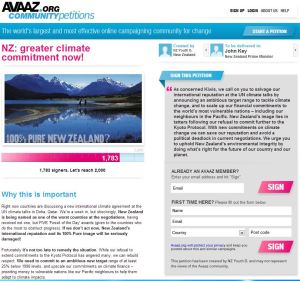Posts Tagged New Zealand
Oh no, not Yahoo! too…
Posted by Ez2bVeggie.com in Uncategorized on August 3, 2014
 Yahoo.co.nz editors need to be fired, and replaced, immediately. Someone with extremely poor judgement last week saw published a completely ridiculous hack-job piece by cringeworthy member of New Zealand’s most poor unfortunate struggling writers. Granted, the guy has actually published, and has published quite a lot of books and articles I do acknowledge, but how many of them are worthy of the ink, paper, and time taken in bringing them into the light of day or neon is another matter altogether, and doubt is cast quite quickly by this filthy piece, a new low of internationally shameful proportions.
Yahoo.co.nz editors need to be fired, and replaced, immediately. Someone with extremely poor judgement last week saw published a completely ridiculous hack-job piece by cringeworthy member of New Zealand’s most poor unfortunate struggling writers. Granted, the guy has actually published, and has published quite a lot of books and articles I do acknowledge, but how many of them are worthy of the ink, paper, and time taken in bringing them into the light of day or neon is another matter altogether, and doubt is cast quite quickly by this filthy piece, a new low of internationally shameful proportions.
The only positive that can be offered is that the dangerously delusional dolt was courageous enough to offer his own name for the by line. His Wikipedia entry lists his previous occupations as, among other things, mathematician, and clown. While his misguided attempts at finding the positives in the world of hurt currently unleashing itself on the globe simply don’t add up, and while others have managed to find the funny side amid the chaos the western world’s elite are causing in delaying meaningful addressing of the challenge, Ken Ring here offers no useful insight, nor accuracy, nor even the most febrile attempts at humour. 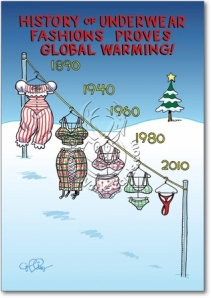
Above and below: Meaningful and effective humour,
infinitely more worthy than Ken Ring’s pointless article
published by the increasingly side-lined Yahoo! NZ news.
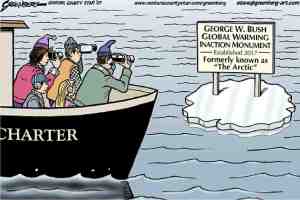 We can tell his statistics and informative tone are simply useless by his complete lack of reference to any authoritative, peer reviewed studies. Why not even one nod to anyone else’s good work, Ken Ring? We are left to believe it is simply because all ten of the brief paragraphs that should have been entitled: ”Ken Ring’s Ten Most Dishonest, Disingenuous, and Daft Reasons Why Global Catastrophe is a Good Thing” are simply pulled out of his black hole of a feeble imagination.
We can tell his statistics and informative tone are simply useless by his complete lack of reference to any authoritative, peer reviewed studies. Why not even one nod to anyone else’s good work, Ken Ring? We are left to believe it is simply because all ten of the brief paragraphs that should have been entitled: ”Ken Ring’s Ten Most Dishonest, Disingenuous, and Daft Reasons Why Global Catastrophe is a Good Thing” are simply pulled out of his black hole of a feeble imagination.
In a completely cold serving of seemingly ironic karmic revenge, the first of these also recently published ”7 Terrifying Consequences of Climate Change” actually begins with reference to a mathematical study to show the great degree of likelihood that killer heat waves are clearly due to human influence on the atmosphere. It is a great pity that Mr. Ring had had no time to research a little further along his apparently self-declared new area of expertise of the mathematics of climate change. Or should that just be ”expert-tease”?
It is inexcusable in this day and age, while people are still suffering in the Philippines and elsewhere around our global village as a result of catastrophic weather events clearly victims of the ”loaded dice”of global warming, that Yahoo! or any other media corporation should release such irresponsibly inaccurate drivel. Both the author and the editor responsible need to be held to account and made to explain why they feel it appropriate to publish this erroneous nonsense in lieu of a verifiable news. The editor should also be sacked forthwith, and Ken Ring’s future writings viewed with ever greater servings of skepticism. 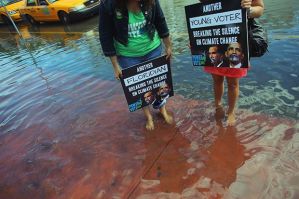 This is not to say that there are no good things to come out of global warming. Of course there will be benefits for some few, such as the real estate industry which will have to find and sell vast new tracts of land to resettle enormous percentages of population in very short spaces of time. For others, the pleasures are simpler and easier to appreciate: this 2011 video describes seeing snow in my home town as a ”once in a lifetime experience.” Actually, I remember quite clearly going to school through a thick blanket of snow when I was in primary school, back in the era of car-free days when gas-powered car drivers had to ration out petrol due, apparently, to the oil embargo imposed from the middle eastern nations.
This is not to say that there are no good things to come out of global warming. Of course there will be benefits for some few, such as the real estate industry which will have to find and sell vast new tracts of land to resettle enormous percentages of population in very short spaces of time. For others, the pleasures are simpler and easier to appreciate: this 2011 video describes seeing snow in my home town as a ”once in a lifetime experience.” Actually, I remember quite clearly going to school through a thick blanket of snow when I was in primary school, back in the era of car-free days when gas-powered car drivers had to ration out petrol due, apparently, to the oil embargo imposed from the middle eastern nations.
Perhaps it should come as absolutely no surprise that this snowy sign from Mother Nature comes at a time when she is so blatantly being violated by the five ”Five Eyes” nations, who, rather than having achieved anything like their much vaunted and mythological energy independence, are actually desperately seeking to drill for any last residue of oil, fracking local neighbourhoods and their water tables beyond repair, and siphoning off final grease spots from the tar sands among the pristine boreal forests in the north of Turtle Island. Set against a backdrop of such disgusting destruction, Ken Ring’s little attempt at a rear-guard defence of the results of the imperialist English-speaking nations’ efforts may seem relatively inconsequential; however, it is exactly this sort of collusion between the media and the uber-wealthy 1% within our five cultural enclaves that has apparently allowed our governmental representatives to continue permitting and even subsidising the fossil fuel and livestock and dairy industries with any semblance of genuine authority.
The intellectual and moral doubt sewed by official and apparently unofficial PR reps makes it easier for us to ”want to believe” that it is acceptable for us to continue in life and ”business as usual.” Unfortunately, that time ended approximately forty years ago. Even a majority of the US population has finally got the memo that global warming is happening and it’s making a mess of the world we would love now, and would leave for our descendants. It’s about time the editors of Yahoo! start thinking about the world they want to bequeath, and it’s way beyond time Ken Ring went and dug out his face paint and red rubber nose again. That would be a much more honourable way to earn another day through his rapidly heating future.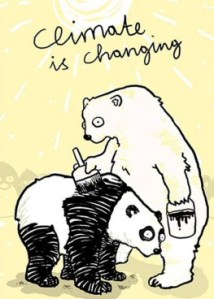
Cop out #18?
Posted by Ez2bVeggie.com in Uncategorized on December 5, 2012
You may well know that one of the most important international meetings ever to occur is currently underway. The strangely named COP 18 is being held in Doha, Qatar, until this Friday. It’s the COP 18 meeting of nearly 200 countries who are tasked this year with finding and agreeing to the details of an effective replacement for the Kyoto Protocol.
Then again, you may well not know about it. Judging by one major online news source, New Zealand certainly seems to be facing a virtual media blackout on the very mention of the two week long conference. One of the nation’s leading news websites, the appropriately named “stuff.co.nz,” returns merely one single article on proceedings, and that’s for all three of the searches under the separate terms: Doha, Qatar, and Cop 18. Appearing as the fourth result of a search for the term Qatar [edit/ update: now the third, perhaps as a result of ranking improvement], but, crucially, NOT appearing under either COP 18 or even Doha, the tone of the article is quite rancid with acrimony and bitterness, virtually espousing a negativity akin to passive/aggressive ranting. Furthermore, it deals not even with the current proceedings of the meeting, but rather questions the “rights” of the host nation to hold the talks in the first place. But more on this tone of implicit vitriol later.
This overt failing of the website demands answers to a string of questions. Foremost in my mind: Why have the editors clearly deliberately avoided making up-to-date news on this conference able to be searched under the most obvious term: COP18, the name of the event itself? Even Qatar, as the name of the country, would be useful as a reference point for some people searching for current stories of this world-shaping event.
This gross negligence leads me to wonder: Why would the editors want to deliberately bury this, the one and only story referring to this, the major environmental meeting on the calendar and concerning all related issues and nations?
To be quite clear: stuff.co.nz is an aggregate news site. It supposedly presents ALL major news articles from ALL the nation’s local daily newspapers throughout the nation. Perhaps such stories have been carried in print but not put online, however, this in itself would be markedly unusual and would raise the question of why those stories have not been published online. Clearly then, there is something extraordinarily strange going on here, for which the editors of all the local daily papers would seem to have something to say which is not being said, online at the very least. Perhaps, for example, editors are venting their views and highlighting the meeting via their editorials, which are generally not included on this site.
To return to the tone of the article, it is rare to find any article on any subject which presents such a litany of examples of negativity in so many different contexts. From the title itself to the quotes, the attitudes presented are critical of the host nation in a way which belies New Zealand’s own hypocritical attitude as a developed nation, reliant on the huge amounts of methane and carbon pollution produced by the livestock industry, and our reliance on the majorly disastrous airplane to get us anywhere beyond Auckland’s beaches.
Clearly, the approach of stuff.co.nz bodes badly for the likely attitude of New Zealand’s representatives in Doha, Qatar, at the COP18 conference itself. Fortunately or not, the bad news for the rest of the world as presented by NZ’s governmental representatives is in fact the case, as is borne out by articles presented by the other news site, nzherald.co.nz. The tone of defensiveness continues even in this most recent of articles from yesterday’s news, though gratefully, the absurd vitriol has abated. Rather, as the title of another piece pointed out a day or two before, “Climate change talks may be ’embarrassing’ for NZ.” Why anyone would bother with the straw man attempt at a handshake pass with the words “may be” here is a laughable question in itself. There is no question, and the better verb form here is an emphatic: ARE. This state of affairs is in fact so offensive to the rest of the world, that even the online activist group Avaaz.com has been called to arms with this petition they are ready to present to the NZ Prime Minister.
In the 1970s New Zealand citizens repeatedly raised record amounts of money for charity on nationwide “telethon” events, and we also learned to feel good about our identity as a naive young nation by doing relatively well in such irrelevant events as the Commonwealth and the Olympic Games (on a strictly per capita basis, of course). In the 1980s we, the people, faced down the might of the US with regard the imposition of the threat of nuclear catastrophe by resisting the visits of nuclear powered and possibly nuclear weapon-equipped ships. We, the people of New Zealand, also stood against the governments of both New Zealand and South Africa, demanding introspection of our own cultures. In a dramatic string of events which saw the streets and the rugby fields covered with riot police, we asked hard questions, namely: the place of politics in sport, and the place of racism in the very structure of our daily lives. It was a time of maturing as a nation; of facing ourselves and taking on our own responsibilities as a people.
And yet in this new century where the major threat is the weather bomb of our own making, we have not enough foresight to insist, loudly and clearly, that our very own leaders stand with those low carbon footprint countries who will suffer most as a consequence of our recent luxuriously oil-soaked lifestyle.
Clearly, that website needs to be renamed immediately. The only question is which is better: stuffall,co.nz, or completelystuffed.co.nz…?
As you contemplate the answer, please go ahead and help the New Zealand government to grow up a bit, do the right thing, and change their tune: please vote in Avaaz’s petition and forward to others who might appreciate the opportunity too.
The Last Empire
Posted by Ez2bVeggie.com in Uncategorized on April 1, 2012
I was deeply saddened on reading the news last week. I learned not only is there a cigarette factory near to my home town in Aotearoa/ New Zealand, but also they are expanding production. As if this was not bad enough, even just the name of the company is an embarrassment: Imperial Tobacco. Finally, it was also sad to see the news report title emphasizing that the factory expansion would create a few jobs, rather than the fact that it will kill many, many more people.
Imperial Tobacco started as a factory in 1928, according to this news story. It was bought out by a new company relatively recently, in 1999. That is when the new company gave it the new name.
Since that time the new company has positioned itself to take over production from a factory in Sydney. What will happen to the Sydney company’s factory personnel is not clear. I suppose they will have to look for other jobs. In the meantime, the old local factory in Petone will produce four times as many cigarettes. But cigarettes kill one in every five smokers. That’s 20% of every one hundred smokers will die from cancer, heart disease, or some other painful and disgusting death. It is hard to be proud of a local company producing this much more pain and suffering.
The name itself is an anachronism and an embarrassment. Koreans know very well the pain associated with the word ‘imperial.’ It is a moniker associated with images and connotations of abuse of power, oppression, subjugation, and exploitation. In a sense then it is both ironic and all too fitting for a cigarette company which makes money from the power of addiction, and subjugates and exploits its customers literally to the point of death for many, and shocking misery for many more.
Finally, I want to offer a very brief media analysis focusing only on the titles of the two news reports to cover the story. It is very interesting to see the contrast between the two different titles of these stories which were published in the mainstream national online news media the same day as each other. The first one reads: “Tobacco deal creates 50 jobs in Petone” and so clearly celebrates the new jobs the factory expansion will bring. It was published at 5 am on Monday morning. The second one is entitled: “Cancer society blasts tobacco export” and was published in the evening at just after 5 pm. It is clearly about the response from the national Cancer Society, although it still contains unnecessary information helpful to the company such as the brand names to be produced, and a return quote and even a picture of the company manager. In these ways then, the impact of the statement from the Cancer Society and the effect of the dramatic verb in the title ‘blasts’ is reduced, and the increased production of a thing which actually kills one fifth of its customers is actively supported. The Cancer Society estimates that approximately 20,000 people will die as a result of the work of those 50 new jobs being fulfilled in Petone. This does not even include the many hundreds, maybe thousands who will be sickened due to second and third-hand smoke.
I remain greatly disappointed in the manipulative local media, just as I am in the abusive, exploitative local company. I do hope all Australian smokers quit smoking soon and the offensively named Imperial Tobacco goes out of business very quickly.
Fifty Years Late, and International Women’s Day
Posted by Ez2bVeggie.com in Uncategorized on March 9, 2012
This week has been important for two reasons quite different from being the start of the new writing course. The first reason is because Tuesday marked fifty years since “a group of scientists in the UK issued the first health warnings about smoking cigarettes,” and the second reason is because yesterday was International Women’s Day [세계 여성의 날].
Fifty Years Late
The ‘group of scientists in the UK’ was not just any random group of scientists sitting around a cafe chatting; it was actually the nation’s top group of most experienced and highly recognized doctors, known as the ‘Royal College of Physicians.’ This Tuesday marked 50 years since they released a report which was really important because it told the English-speaking world very loudly and very clearly of the very real, very direct, and very dangerous link between smoking cigarettes and a large collections of diseases, including cancer, lung disease, and heart disease. To mark the fiftieth anniversary, they released a new report which both reviewed the original and offered updated information as well. You can read it here.
I entitled this section ‘Fifty Years Late’ because, despite the information within the report being accurate and important, from start to finish, from the original report in 1962 to this week’s update, this information is late. German scientists knew and publicized quite loudly and clearly as early as the 1930s that cigarettes were extremely dangerous to one’s health. As a result, German military rations did NOT include cigarettes, as distinct from those in Allied nations (the UK, the Commonwealth, and the US).
Furthermore, the eminent British physiologist Sir Richard Doll had proven for himself and the English speaking world in 1952 the direct link between lung cancer and the increased risk of heart disease. Why did it take a full decade before the RCP released a report on this crucial information?!
Since then, this information is clearly not just late, but it is also very sadly and very badly reported by the media. Even Al Jazeera’s video clip highlighting the anniversary of the original report starts by showing images of people happily smoking.
The BBC’s clip is even worse, showing mini-interviews with both men and women, all of whom speak with high-class British accents, and all of whom profess not to care about the report but rather speak of their wish to continue smoking. While it is of course possible that all these people were genuine random members of the public, the fact that all these people were apparently upper class and all seemingly smokers in itself demonstrates a very narrow selection of the wider public for the BBC to select for interviews, and so amounts to free advertising for cigarette companies, and so the eventual but unnaturally early, and likely painful death of so many more of the BBC’s viewers.
Media, and particularly news – with its apparent goal of representing truth and impartiality in reporting of what the unwary public viewers hope are facts – has a huge responsibility to not end up working with companies which aim for profit over the health of the public. And yet, to not actively work against those companies is to by default end up working for them. Showing pictures of happy smokers is the same as advertising for those companies, even in a news clip which features an anti-smoking message and a person suffering from illness because of her history of smoking. For this reason too then, I use the word ‘late’ in my title in its other meaning, to also mean ‘dead’ or deceased, and to represent the history of the news media in contributing to the deaths of so many more of their own viewers by not working harder and more honestly in the fight against smoking.
2012 International Women’s Day
Thursday marked the 101st International Women’s Day. Similarly to the history of work against the promotion of smoking, the advance of the right to equality of women around the world has been painfully slow, with many governments continuing to make excuses such as the state of the economy for not supporting women by providing help such as ‘safe homes’ as places of emergency refuge for victims of domestic violence.
Another important way of supporting women was finally achieved only in recent years in Aotearoa/ New Zealand, which included the passing of the Domestic Violence Act of 1995. This allowed the police to enter homes where domestic violence [가정폭력] is occurring, no longer allowing and empowering men to assault women and escape criminal charge merely because it was their own wife or partner, and home. The availability of the issuance of a ‘Protection Order’ (if someone feels threatened), or a ‘Police Safety Order’ (if the police believe there is a danger to someone within a household – ie. very importantly NOT needing the assent or agreement of the woman involved – ) are very great developments in the laws of land working for the good of women. I really hope my adopted home of South Korea develops something like these two measures for my Korean mothers, sisters, and nieces, sometime very soon. I have seen far too many women and children (male and female) hurt and recovering from obviously traumatic family violence here.
Finally, even though it has taken a number of years, it is good to finally see the message launched only a few years ago reach more widely and have greater impact and reception around the world. This message is that the effects of climate change hit and hurt women and thus by extension again children more than they do men.
The importance of the effects of climate change was underscored by TEDtalks recently hosting the great Dr. James Hansen who spoke about his life’s work studying climate change and then promoting the crucially urgent need to start really dealing with it as a major international problem.
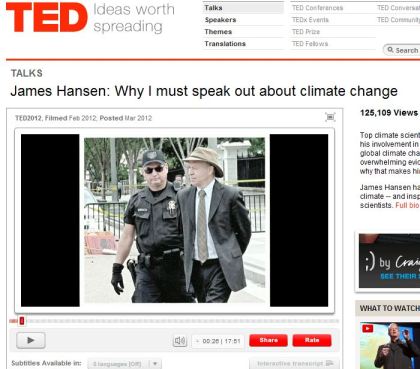
Would you risk arrest for your beliefs? What do you feel strongly enough about that you would ever risk arrest? And, what other grandfathers do you know who would risk arrest for their beliefs?
Despite the fact that Dr James Hansen is obviously a man working hard at promoting this important issue, recent surveys show that it is mostly women who believe in the importance of dealing with climate change. What about you and your friends? How many are women, and how many are men, and of them, which ‘believe’ recent deadly extreme weather events around the world are as a result of climate change caused by ‘man-made’ global warming?
Another commentator draws the links between racism and sexism, and shows, despite her obvious ongoing disdain for racism, that among young people, the effects of sexism are not only more violent, but they are also less openly acknowledged and more widely accepted as simply being okay, and just a matter of current local culture. I agree with this writer that this is a very sad thing to realise, and I hope all such cultures change to a state of greater quality equality and safety for women immediately.
It has been interesting to note the different reactions to International Women’s Day between the UK, the US, and South Korea. The Prime Minister’s office of Great Britain released a report which was quoted heavily in the apparently left-wing news site Huffington Post describing domestic violence as an ‘iceburg,’ and yet the same report was then effectively critiqued by Al Jazeera in what does appear to be a case of balanced journalism, highlighting as it does the cuts by central government in that country to women’s programmes, although not quite putting those cuts in context. In contrast, in the US, one woman in particular is standing out for her stance against the Republican party’s attack on the rights of women there. Teresa Sayward (NY,R) says that she would rather vote for the Democratic President Obama than her own party because of the Republican attack on the rights of women recently.
In Korea, the Korean Herald features a report on international efforts to mark the day almost everywhere except Korea itself. The report is notable for being quite full and long, which is good, and also for featuring a nice large photo of Angelina Jolie’s face, which is never bad exactly, but somewhat distracts from the point of sexism in the most unfortunate way, although yes, one could equally try and argue that it helps attract attention to those points for the men initially interested only in looking at her picture. How strong a position in an argument is this, do you think?
The Korea Times features a weak and wordy editorial by a professor from a university in India, which is easily characterized by its laughable paradox noted between the two lines revealing a pretty bad break from logic. In the first such line, he states: “Man and woman cannot be thought of as separate entities.” And yet nearer the end of the piece, he states: “Women are more existential than men mainly because of the former’s higher emotional quotient including patience, motivation and empathy with others in all circumstances.” Well, which is it, ‘M.M. Goel’ ? Are women the same, or are they different? I am really not sure of this guy’s point. He seems to use big words to drift around the idea of saying not much at all. It is a disappointing way for the Korea Times to mark such an important occasion.
In conclusion then, the abundance of bad quality media attention to an important week of media events merely serves to make the lack of progress on these important issues all the more obvious. The fights – against the power of tobacco companies and for the equal rights of women, in Korea as elsewhere – continue to be difficult, in a large part no doubt because of the very lack of support from the media itself.
